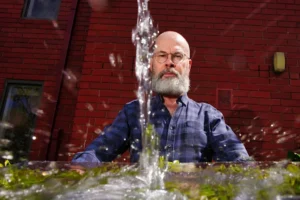
Clayton Harrop believes it’s inherently manly to pursue — to chase, to improve, to gain experience. That drive, he says, once shaped his sex life too.But he also believes in purity. Not his own, though, but for his future wife.”I don’t like the idea of a super high body count in women if I’m completely honest,” Clayton, 29, told The Feed on a discussion panel about modern masculinity. “Yeah, that bothers me … I want to be her first.”
Clayton admits it sounds “hypocritical” because he’s had “his share of women” but says sex is sacred — the “most intimate thing in the world” — and should be treated with reverence. A reverence, it seems, that flows one way.
He doesn’t regret his past partners and acknowledges the double standard, but doesn’t walk it back. His sexual experience, he insists, made him better.”You’re better at sex. You can better sleep with your partner and give more to her.”
It’s a view that experts warn is often harmful to women – and also men.
Street interviews won’t stop asking about ‘body count’
Clayton isn’t alone in his worldview.The idea of “body count”, how many people someone has slept with, has become a go-to topic online. It’s not a new obsession, but it’s found a revival in street interviews, dating podcasts and social media debates.
In them, a certain script often plays out: men “level up” through experience. Women, not so much. Too many and she’s “easy” or “less desirable”. Too few, she’s a prude. Too much sex from anyone, and they’re labelled not “relationship material.” None, and there’s something wrong with them.
“I don’t want 20 other men able to say: ‘Yeah, I’ve been with her, bro,'” Clayton says.Despite the different expectations, he says it’s not about judging women, but about what their sexual choices represent to him — values, restraint, “femininity”.But it’s misogyny, says Lauren Rosewarne, an associate professor at the University of Melbourne’s School of Social and Political Sciences who researches gender, sexuality and feminism.”I have incredible concerns with women’s value being connected to both their perceived ‘f—ability’ — the extent to which men want to have sex with her — as well as her worth being tied to how much sex she’s had,” she says.She sees it as a tool for policing women’s behaviour, while allowing men to write the rules and excuse their own choices. To her, it reinforces a system where women are judged and men are given leeway under the guise of “preference” or principles.
Jeff, a social advocate who has dated both men and women, sees the body count narrative as just another way to police women’s behaviour.
Men’s coach Clayton Harrop (left), anti-violence advocate Tarang Chawla and social advocate and commentator Jeff Kissubi on The Feed’s Masculinity debate.
“I wouldn’t care at all,” he says. “If someone shares that with me, fine. If they don’t, I still wouldn’t care because I wouldn’t base a relationship on how many people they’ve slept with. That mindset is odd to me. I think it stems from power and control.”
Pressure looks different for men and women
Rosewarne says that double standard often overlaps with purity culture — a belief system rooted in faith that links sexual choices to moral values. She says it’s important people can express their faith in ways that are meaningful to them. But historically, she says, purity culture has “disproportionately screwed over women”. While both men and women face pressures around sex and desirability, Rosewarne says the consequences aren’t the same.”There are still different penalties attached to acting on that if you’re a woman.”
Since the 1970s, studies have consistently found that women with strong Christian beliefs that emphasise abstinence are more likely to experience sexual pain disorders, according to research published in Sociology of Religion.
It positions women as responsible for tempting men, and burdens them with being the sexual gatekeepers. That’s a lot to carry.
Lauren Rosewarne, associate professor at the University of Melbourne’s School of Social and Political SciencesSome women exposed to negative beliefs about sex during childhood reported feeling more fear, pain and disgust during sex. “It disadvantages women and constrains their behaviour in ways it doesn’t for men,” Rosewarne says.
“It positions women as responsible for tempting men, and burdens them with being the sexual gatekeepers. That’s a lot to carry.”
Clayton isn’t alone in his worldview, with the conversation gaining attention online. Source: Supplied
She also notes that men face their own set of expectations, measured by different metrics, but restrictive in their own way.
“I have concerns about men’s value being connected to their perceived worth. That worth might be tied to resources, which it historically has been, but also to how much in demand they’re seen to be.”
Assumptions made based on numbers
Dr Millicent Churcher, a lecturer in philosophy at Australian Catholic University whose research focuses on sexual ethics, says people often treat “body count” like it’s some kind of perfect metric, as if there’s a magic number that means someone’s “good in bed”. But in reality, research shows the biggest predictors of sexual wellbeing are communication and trust and being on the same page.The pressure on men to “perform” sexually, or appear to, is real.
About 47 per cent of young Australian men said they felt pressure to live up to the idea that a “real man” should have as many sexual partners as possible, according to The Man Box 2024 report from Jesuit Social Services.
About 56 per cent believed there’s an expectation that a “real man” would never say no to sex. But around half said they didn’t personally feel these pressures, highlighting a gap between social expectations and individual beliefs.”Body count, what does it really tell you?” Churcher says. “I don’t see it as necessarily mapping onto sexual desire or to sexual skill or expertise.”
“You might assume someone with a high body count has a high sex drive or is really experienced. That may not be true.”





